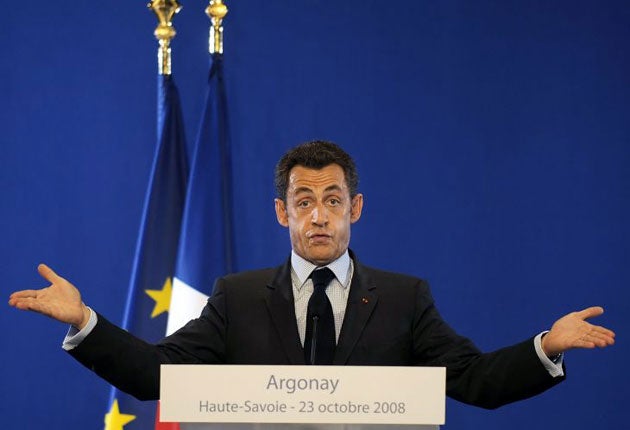Sarkozy challenges Germans with new Europe power bid

President Nicolas Sarkozy would like to emerge as the economic “president” of Europe until 2010 - overseeing a united response to the world financial crisis by the 15 Euroland nations and Britain.
The French president has launched a diplomatic and media campaign to suggest that his current role as conductor of the European Union economic orchestra, due to expire in December, should be extended informally, until the end of 2009.
Berlin, and several other capitals, are expected to oppose the idea.
Fears – or hopes – that President Sarkozy wants to use the crisis to impose a more “dirigiste” and less free-market approach on European economy will be heightened by another proposal that he tabled today. France is to create a €175bn “sovereign fund” to invest in “strategic” companies threatened by foreign take-over during the crisis. M. Sarkozy wants all EU countries to create similar state investment funds and to use them jointly to protect European companies if necessary.
For the second time in three days, President Sarkozy called today for the loose “Eurogroup” of the countries using the Euro to be turned into a semi-formal “economic government” for Europe. He suggested that the Eurogroup should, in future, meet regularly at the level of heads of state or government – on the model of the successful summit at the Elysée Palace two weeks ago which agreed a Europe-wide rescue strategy for banks.
President Sarkozy evidently also believes that the crisis is a perfect opportunity to impose his long-held view that the EU has become an over-bureaucratic institution, which puts free market dogma ahead of the true political needs of governments and ordinary people.
In his speech at Argonay, near Annecy, in the French Alps today, he said: “The technocratic Europe, the apolitical Europe, the debate-free Europe, the Europe which could not take decisions, which could not act is about to give way to a political Europe which can decide, act and think.”
President Sarkozy has not spelled out his personal ambitions in public. The French minister for Europe, Jean-Pierre Jouyet said today that M. Sarkozy was “not necessarily” seeking chairmanship of the Eurozone (currently held by the Luxembourg prime minister, Jean-Claude Juncker.)
However, officials at the Elysee Palace have briefed French journalists in recent days that President Sarkozy is the natural choice to preside over a series of Eurogroup summits next year. They argue that the two countries which follow France in the six monthly rotations of the EU presidency – the Czech Republic and Sweden - are outside the Eurozone and do not have the political clout to “lead” the EU out of what looks likely to be a profound recession.
In the coming 15 months, they suggest, Europe must be led by a strong and energetic figure from a large member state: ie M. Sarkozy.
French officials say that, other than the 15 nations using the Euro, President Sarkozy envisages that the Prime Minister, Gordon Brown, would attend such eco-financial summits as spokesman for the second largest European economy and the City of London. Mr Brown attended, at his own request, the landmark Elysée Eurogroup summit on 12 October – the first meeting of its kind.
Tying the UK government into the management of the Eurozone is seen, cautiously, by French officials as a way of bringing Britain closer to the Euro politically, even if not necessarily closer to Euro membership. M. Sarkozy’s plan will, therefore, be examined with great caution in London - but also in Berlin, Prague, Stockholm and several other European capitals.
Successive French governments have campaigned for more political control of the Euro and the “Euroland” economy. Successive German governments have rejected the idea, preferring to leave the management of the Euro to the European Central Bank.
German officials fear that Paris sees European economic government through interventionist eyes which will create, in the long run, more problems than they solve. President Sarkozy’s proposal for European “sovereign” funds to protect strategic industries has already set alarm bells jangling in Berlin.
President Sarkozy, emboldened by the success of the EU bank rescue plan, believes that he has a unique opportunity – even duty – to take charge.
The existing structure of six-monthly, rotating EU presidencies was due to be replaced, in part, by a European Council president, appointed for four years. This plan has been blocked by the Irish rejection of the Lisbon reform treaty.
President Sarkozy’s staff have been busily briefing the French press in recent days. A combination of circumstances, they suggest – the crisis , the Irish “no” and the probable inadequacy of the coming Czech EU presidency – have made President Sarkozy’s continuing leadership indispensable.
The financial crisis has, if anything, sharpened tensions between President Sarkozy and the German Chancellor, Angela Merkel. The French and German leaders will discuss the proposal for boosting the role of the Eurogroup when they meet on 10 November.
French officials say that German opposition to “Euroland” government is softening. However, a German government spokesman said today: “The natural chairman of such a group would be the Luxembourg Prime Minister and Finance Minister Jean-Claude Juncker.”
Join our commenting forum
Join thought-provoking conversations, follow other Independent readers and see their replies
Comments